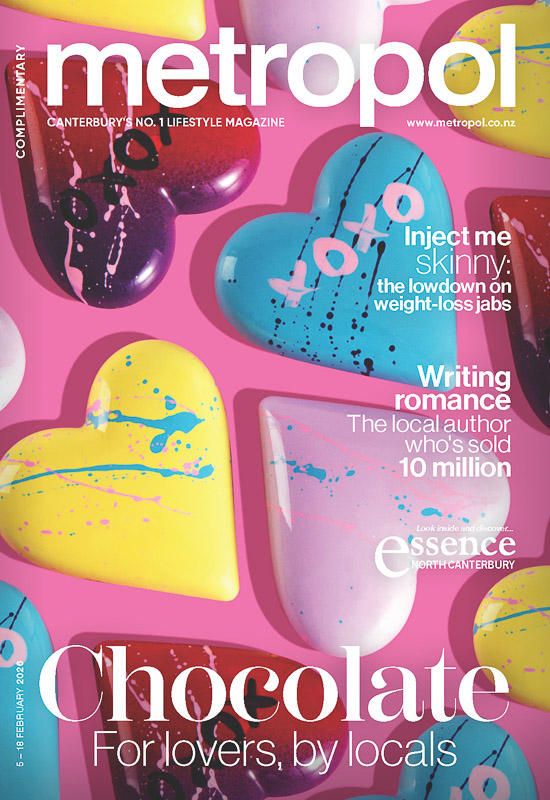
Resilience in action
Resilience and wellbeing have recently gone from fuzzy buzzwords, to being recognised as extremely important concepts that we need to not only respect, but master, as our health and safety has been threatened.

So we caught up with one of the country’s leading academics specialising in the area, adjunct fellow at the University of Canterbury, Dr Lucy Hone who, along with Dr Denise Quinlan, heads the New Zealand Institute of Wellbeing and Resilience (NZIWR), about practical strategies for coping in the face of uncertainty and threat.
What is wellbeing and why is it critical to promote it?
I did my PhD looking at different ways wellbeing is defined and measured. On the back of that research we define wellbeing as ‘feeling good and functioning well’.
Because it’s not just about happiness – the feeling good bit – but also all the ways of thinking and behaving that enable us to get through, show up in our daily lives and perform to the best of our ability; I’m talking about experiencing strong, supportive relationships; having a sense of meaning, purpose and direction in daily life; being able to know what your strengths are and play to those strengths to leverage your best performance and weather life’s crappy times.
Strong supportive relationships, whether friends, family, at work or through school, hobbies, cultural or religious groups also have a huge impact on our resilience – either promoting or reducing it too. We don’t live in a vacuum but are very much part of our environments.
We’re out of lockdown now, but how long should we be hyper-aware of our mental health?
We need to always be aware of what’s working for our mental health and what’s dragging us down.
There is so much you can do yourself to promote and protect your own wellbeing.
In our work we teach people to catch unbridled pessimism and negativity, and establish whether the way they’re thinking is a) an accurate reading of the situation and b) if it’s helping or harming their quest to achieve what they’re trying to achieve.
What we have seen during the Covid pandemic is that the people who are operating from no reserves of wellbeing or who are really rigid in their ways of thinking and acting don’t do so well when their everyday environment is changed.
Mental agility is really important for resilience and it’s going to be absolutely critical as we move forward.
Some people are going to be going through some really tough times and I absolutely empathise with that, but the people who do best are the people who appraise their situations accurately, are realistic in sizing up the threat and somehow manage to accept what has changed and find a new path that will work for them.
I’ll grant you, saying that is much easier than doing it, but the research is clear: those who are flexible in their thinking and attitude do better during times of crisis and change.
What are some practical strategies for coping with challenging times?
I would suggest people look at their media intake over a 24-hour period and ask themselves if taking it all in is helping or harming the way they’re feeling and functioning.
Give your brain a break from Coronavirus; reading about it, talking about it, it’s exhausting. Give your poor, overthinking brain a break from time to time. One good way to do that is by taking part in something that really absorbs you.
Also, be really deliberate in seeking out the people, the places and the things to do that make you happy. We’re all concerned or worried, that’s totally normal, but studies show that positive emotions also have an important role to play during times of crisis.
One showed that the more positive emotions people felt in the period post 9/11, the more likely they were to be resilient.
I’m not devaluing negative emotions or saying we should shy away from them, but given the research it makes sense to also keep topping up on the things that make you laugh, feel calm, proud, inspired, awestruck etc.
Positive emotions are fleeting and tend to bounce off us; negative emotions are sticky like Velcro and really good at hanging around.
The trick is to know all those things that bring pride or amusement or inspiration and think ‘where can I get these from right now?’ because they’re important.
Be kind to other people but also remember to be kind to yourself too.
Research shows 76 percent of us are kinder to others than ourselves.
During lockdown, we came across a lot of people who were really beating themselves up on how unproductive they were being, how weak they felt and how exhausted too.
That is totally normal when there’s such huge stuff going on in the world, so we’ve been running webinars about lowering the bar, being kind to yourself and being realistic; it’s ok to not be okay right now.
Don’t beat yourself up, believe me, you are not alone!
The New Zealand Resilience Institute is now running the NZ Diploma in Positive Psychology and Wellbeing here in Christchurch over one week from 23 September. For more information, email sally@nziwr.co.nz. NZIWR’s webinars and other resources are available on the website.



